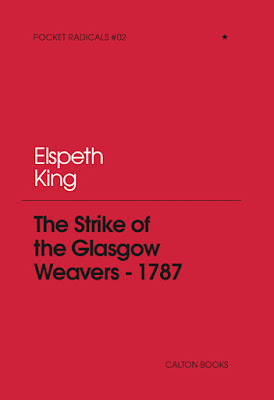You would imagine by now the ordinary people of this country and other countries, would have realised that no matter what authority was in power, they never have the interests of the ordinary people as an agenda. Without traveling too far from my home, history tells us we, the ordinary people, have to always struggle and fight for any semblances of having fairness and justice, and so often we have failed. Have a glimpse of our fair city's history
Let's go back to 1787, Glasgow weaver strike for better conditions,
The 39th Regiment of Foot, under the command of Colonel Kellet was sent. With them went the Lord Provost, the Sheriff-Substitute, a Magistrate and others intent on dispersing the weavers. The groups met at a spot near Drygate Bridge. The soldiers were ordered to open fire, 3 weavers were killed outright and three were mortally wounded. A considerable number were wounded. How many can only be guessed at. 15 February 1800: Unemployment and high taxes during this period caused wide spread
demonstrations which culminated on the 15th. of February 1800 when angry
and hungry crowds took to the streets. They marched along Argyle Street
attacking meatsellers and grocers’ shops. Meanwhile vast crowds in the
districts of Townhead and Calton were also smashing into similar types
of shops. The authorities felt compelled to call out the troops to
disperse the rioters. 1812 Weavers strike: 1812 saw in Scotland until that date. The weavers were on strike in an
attempt to protect their living standards. The strike was on the whole a
peaceful protest, though the Magistrates and the Government claimed
otherwise in an attempt to become heavy handed with the strikers. The
strike lasted three months and eventually run out of funds and
collapsed. Because of this strike Trade Unionism was declared illegal in
Scotland and remained so until 1824. Seven of the strikers were
arrested and charged with 'illegal combination' and were each sentenced
to 18 months in prison. 6th. March 1848: There was a serious riot in the city of Glasgow on the 6th of March
1848. It came about when the unemployed operatives had expected a
distribution of provisions. The provisions never appeared and the
starving and angry crowds set off up Irongate and other main streets of
the city centre breaking into food and gun shops. Business in the city
came to a stand-still and all city centre shops closed. The people
continued to march through the streets shouting 'bread or revolution'.
Eventually the 'riot act' was read. Other groups marched off in other
directions entering food shops and demanding bread. The authorities,
alarmed at the events sent to Edinburgh for more troops. The following
day crowds again gathered at Bridgeton where 'out-pensioners' were under
arms. A young boy threw an object at the troops and was arrested but
the crowd stormed the arresting group and rescued the boy. Police
Superintendent, Captain Smart gave the order to fire: five of the crowd
were shot. The Military continued to patrol the streets and the crowd
still lined the streets for some days. All public offices were securely
guarded. 1915 rent strike: 1915 saw Glasgow and Clydeside districts gripped by a massive grass
roots movement against large rent increases imposed by landlords. Over
25,000 tenants refused to pay rent increases. The struggle spread to the
Clydeside engineering workshops and shipyards, forcing the government
to introduce the 1915 Rent Restriction Act. Glasgow's Bloody Friday: In 1919 the struggle for a shorter working week came to a head with a
strike which had the support of practically all the workers in the area.
Marches and demonstrations were organised. One massive demonstration in
George Square caused the authorities some concern and the police baton
charged the crowd creating mayhem. The government fearing revolution
sent English troops with tanks into the city.
Of course this is just a snapshot of the struggles of the ordinary people of our fair city, there were many, many more and this is typical of all countries across the globe. We can jump forward and today in the UK there are strikes by post workers, bin collectors, railway workers, dock workers, warehouse workers office staff, and many many more groups, all struggling for a decent life, just as the weavers of 1787 tried. In all these years nothing has really changed. Surely now with all the continuing hardship, poverty destitution and our knowledge of the system, is the time to make that change and bring an end to a society based on profit for the few. Time to create that better world where, we see to all our people's needs, a world of mutual aid based on co-operation between communities freed form the greed driven profit motive. Workers, stay home and the system collapses.
Visit ann arky's home at
https://spiritofrevolt.info















